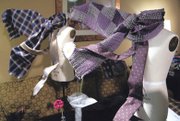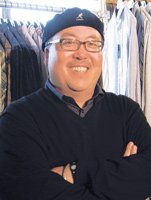Attendance Up at West Coast Trend Menswear Show in Los Angeles
What a difference a season makes.
There was a certain buzz in the air at the recent West Coast Trend Show, where about 175 registered menswear buyers visited three floors of suites centered around an airy courtyard at the Embassy Suites LAX North, near Los Angeles International Airport.
The Jan. 29–31 trade show saw a 9 percent uptick in specialty-store buyers, while participation by sales representatives held steady at 89, said the show’s organizer, Ken Haruta, a menswear sales rep himself.
“I think the retailers are more positive and are replenishing their goods,” Haruta said. “They have kept their inventory levels lean, are coming back with better attitudes and have more open to buy.”
The encouraging turnout was a good sign that the menswear business is slowly digging out of its deep economic hole after sales plummeted by double-digit figures last summer over the previous year.
Retailers visiting the biannual show weren’t as nervous as they were last summer, when men seemed to have taken a season-long vacation from spending. But menswear is still on a tricky trajectory to navigate.
“It’s still tough. It has gotten better, but it’s not great,” said Gordon Schwartz, who owns Finn, a men’s specialty store opened in 2005 in Portland, Ore. “At the end of last year, you felt it was stabilizing.”
Buyers were still looking for unique and key items that would lure men from the front window and into the store. That’s what John Faul of the Red Zone Agency in Newport Beach, Calif., specializes in. This year, he has taken on a new line that uses pieces of old boat sails and incorporates them into boardshorts. The line, called Seabags Men’s Swim, is manufactured in Newport Beach, but its parent company is in Portland, Maine. “People had a good holiday, so they are optimistic but still cautious,” Faul said. “So they want something unique. We are trying to bring different things to stores they don’t have.”
With that in mind, Faul also represents Red Jacket, a line of retro baseball T-shirts, fleece jackets and caps that have a vintage feel and are splashed with old logos from U.S. baseball teams. Many of the buyers at the show were so intrigued by the line that it sparked animated conversations about old baseball greats, world records and sports lore.Exploring new territory
For Michael Black, who represents three casualwear men’s lines—Saltaire, Tailorbyrd and Age of Wisdom—the menswear business has shown marked improvement in the last year. “It’s starting to get better,” he observed. “Stores are open to new ideas and are buying younger.”
That was seen at Southern California menswear store Men’s Land, which has outposts in Carson, Fontana, Santa Ana, Culver City and Los Angeles. The chain’s owner, Mohammed Azzam, said he has expanded from primarily hip-hop merchandise to premium labels, such as True Religion and Monarchy, and skatewear, such as Crooks & Castles. “The key to success is to serve everybody,” he said in between browsing the lines.
The show is a good place to buy higher-end lines for stores that serve the discriminating customers who appreciate fine fabric and good design. That was one of the attractions for Tom Gangitano, co-owner of the upscale Gene Hiller Menswear store, launched in 1953 in Sausalito, Calif. The emporium serves an affluent clientele between the ages of 35 and 65 in Marin County. It was named one of Forbes’ top 10 clothing stores for men in 2008. “People seem to have gotten over the tough times,” said Gangitano, whose store carries a large selection of Italian menswear. “The key to our success is the longevity of our staff and quality merchandise. It’s a relationship business.”
Gangitano was looking for lines that had high-quality fibers and fit. At the same time, he was buying hybrid jackets that could work as outerwear or a sports jacket. “The casual sports shirt has become the new tie and the sports jacket has become the new suit because of lifestyle changes,” he said, noting that even his clients are taking it down a notch when it comes to formality.
Less formal wasn’t good news for Geoff Nicholson, who owns Geoff Nicholson Neckwear in San Juan Capistrano, Calif. He said the colorful Italian-made ties he designs have been a difficult sell. “Ties is a tough category,” he observed. “It is the one category people don’t have a problem putting off.”
Several sales reps were banking on the “Made in USA” label and high-quality elements to advance their lines. Julie Norwood’s casual shirt line from Gitman Bros., based in Ashland, Penn., has all its merchandise made in the United States. “People are being a little more optimistic. They are hopeful and think it is time to shed the old thoughts and move on,” she said.
At the suite next door, Tony Maddox had a line of custom-made and ready-to-wear shirts and pants owned by Individualized Apparel Group, the parent company of Gitman Bros. His labels—H. Freeman Clothing, John Cooper Savile Row Clothing, Corbin Trousers and Individualized Shirts—are made primarily in the United States. The company banks on fine-tailored details—such as 25 different collar styles, 12 cuff styles and eight pocket styles—to sell its clothing. “Custom menswear is doing very well right now,” Maddox said. “None of my lines had less than double-digit increases last year.”























